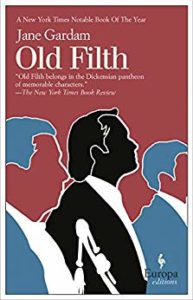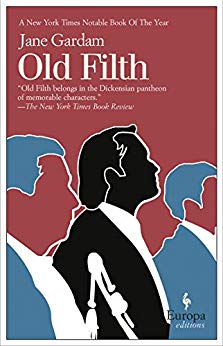 Edward Feathers, known as Old Filth (it is said that he invented the term F-ail I-n L-ondon, T-ry, H-ong K-ong), or Dear Old Filth in his dotage, is the epitome of the British character, stiff upper lip, impeccably and appropriately dressed, reliably well mannered, takes his licks without complaint, and keeps his secrets to himself. Feathers has the added advantage of being witty, handsome, and overall well put together.
Edward Feathers, known as Old Filth (it is said that he invented the term F-ail I-n L-ondon, T-ry, H-ong K-ong), or Dear Old Filth in his dotage, is the epitome of the British character, stiff upper lip, impeccably and appropriately dressed, reliably well mannered, takes his licks without complaint, and keeps his secrets to himself. Feathers has the added advantage of being witty, handsome, and overall well put together.
Gardam’s storytelling skills are subtle and deft, skipping around in time, maintaining characters as they age, catching deep ideas in nets of pleasant description. She does a brilliant job of making us care about this man of mixed vice and virtue; gifted and well behaved, yet unfeeling, willfully ignorant, unwilling to adapt or change, a terrible snob.
Feathers, this bright, agreeable fellow, marries Betty, a dumpy Scot who shares his background as a child of the Raj brought up in the Orient. Betty, too, knows how and when to do the appropriate thing. She gardens, joins a book club, hosts perfect parties—all expected of a woman in her station as the wife of an influential and wealthy judge. They agree on the stiff upper lip thing, scorning double beds as too bourgeois, turning away from intimacy for the last thirty years of their marriage after a burst of lust in their youth. Betty’s taking of a lover, a serious lover whom she actually loves, is all part of the British Raj thing; people far from home, bound inextricably to each other, bearing the burden of upholding the Empire, have to find a way somehow to be human.
Old Filth’s secret is better hidden and more complex than Betty’s lover. He was born in the dripping heat of Malaya to a mother who died three days later of puerperal fever, and a father who doesn’t even accompany his wife to the boat that would take her up river for the birth. The frigidity of the marital relationship causes the Malayan wet nurse accompanying the pregnant woman (in case she couldn’t feed her child) to wonder how this baby was ever conceived.
When the boat returns to the village, Edward’s father ignores his newborn son and consigns him to the Malayan wet nurse who raises him in her village for the next ten years, giving him the closest thing to a loving family that he will ever know.
Then bang! The English missionary in the neighborhood tells Eddie’s father that the boy is going native and must be sent to England to be properly educated. The father makes no objection, barely acknowledging the boy himself, and Eddie Feathers becomes a member of a tribe called “Raj Orphans,” those who were ripped from their families serving in the East to become proper Englishmen and women. The Welsh family he is given over to mistreats him as badly as any of Dickens’s imaginations.
The losses of family, ersatz family, friends, health confuse him. He finds his shape at the benevolent English public school he attends after his Welsh foster parents die. But the losses continue. He becomes gravely ill and is robbed of everything he owns on a trip back to Malaya at the invitation of his father, who has disappeared by the time he arrives.
The boy is too bright and beautiful (possibly also lucky) to be lost to poverty, and over time he finds himself a wealthy judge in Hong Kong, a fixture, with Betty, in the ex-patriate community there. Retirement and circumstances bring him back to England in his old age, where he makes do without complaint, dusting off his old bowler hat when he goes to town.
When Betty dies, he once again loses his shape, finding some solace in the company of her lover, whom he used to despise. But the lover, his only friend, dies as well.
In his isolation and grief, he is confused by a flush of carnal desire, though the energy of this desire prompts him to embark on adventures; some near, some far. His last adventure is a return to Malaya, the place he hadn’t been aware he had been yearning for all his adult life.
It’s noteworthy that someone who has suppressed so much emotion would live so long. You’d think the grief would have swallowed him or led him to drink. But he bounces back again and again from setbacks that would have put another old codger on his back.
Perhaps it was the experience of becoming whole again as he stood at the top of the airplane’s gangway in the “thick, glorious heat” and “the old, old beloved smell” of Malaya that caused his old heart to rest in peace. That heart had been so stiffened by incessant propriety that it could not take in all that joy.
He was mourned at the London Bar as a “benevolent old bugger,” whose brilliant legal work would last. His past and his secrets were known only to him.
